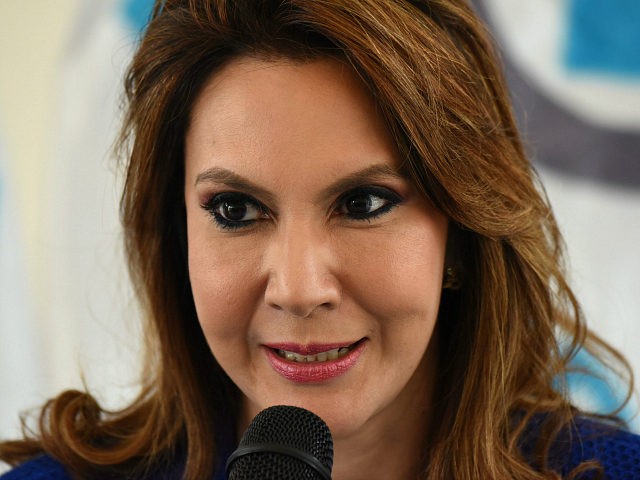A top court in Guatemala is expected to rule on Monday whether or not to uphold a constitutional ban that allegedly prohibits Zury Rios, a conservative presidential candidate and daughter of a former military dictator, from running for president due to her father’s participation in the country’s 1982 coup.
Her supporters in Guatemala believe it is unfair for Rios to be judged for the sins of her father, Gen. Efrain Rios Montt.
The late Rios Montt served as the right-wing military dictator backed by the United States who helped oust the government of Gen. Romeo Lucas Garcia over alleged corruption and vote-rigging in 1982 during the Central American country’s civil war between communist guerillas and the government.
Guatemala’s fairly new constitution, adopted in 1985, does bar family members of coup leaders from running for the highest office in the country.
Article 186 of that document states, “The relatives [of coup leaders] to the fourth degree of consanguinity and second of affinity” are not allowed to run for the office of president or vice president.
This year, the country’s top electoral body — the Supreme Electoral Court or TSE for its Spanish name’s acronym — filed an appeal to the country’s top constitutional court against provisional protection granted by the nation’s Supreme Court.
The Supreme Court cleared the way for her to continue with her presidential campaign this year, echoing its decision that allowed Rios to run in 2015.
During the Breitbart News Saturday show on Sirius XM Patriot Channel 125, Cristy Lopez-Ibañez, a Guatemalan-Cuban columnist and political activist who supports Rios for president, stressed to host Matthew Boyle that it is unfair for the candidate to be held responsible for her late father’s actions in the early 80s.
Referring to the electoral body, the Guatemalan activists told Breitbart News, “They’re opposing her candidacy because she is the one person who can actually change things. Of course, they’re talking about a constitutional [ban] they want to apply that, in my opinion, doesn’t apply to her.”
“This constitutional prohibition that they want to apply, I think, is ridiculous because you don’t punish a daughter for something that you’re dad supposedly did,” she added.
Lopez-Ibañez argued that the constitutional ban was only meant to stand for a limited time, adding that it now violates her “human right” to run for office.
“She shouldn’t have to pay for the sins anybody [else] committed,” she said.
Rios’s detractors, coming from both the right and the left, just do not want her to be president, Lopez-Ibañez declared.
“Her chances of winning are very high. So, it’s not only the left that’s against her. There are also various groups that are from the right that are also [plotting] against her,” she said.
Lopez-Ibanez described Rios as a Christian conservative. She acknowledged that although the candidate is not perfect, the public trusts her to keep her promises, which she said makes the candidate similar to U.S. President Donald Trump.
Guatemala’s constitutional court is expected to issue a final decision on whether or not to allow Rios to continue with her campaign on Monday, making the upcoming week decisive for the upcoming general election on June 16.
Rios, one of the top lawmakers in the country, also contends that the Guatemalan government should not punish her for her father’s sins.
“My father is my father. I love him. I respect him. But he was president in the last century. The person running for president this century is me,” Rios declared recently.
In 2013, a Guatemalan court convicted Rios Montt of genocide and crimes against humanity targeting the country’s indigenous Maya population during his short 1982 to 1983 reign, but officials reportedly set aside the ruling.
Rios Montt died before another trial was held. Lopez-Ibanez praised Rios Montt, noting that he was closed to former U.S. President Ronald Reagan, improved human rights, restored order, and defeated communist guerilla groups.
She said the charges against the former dictator stem from the left’s resentment towards him taking power.
According to the Encyclopedia Britannica, Rios Montt did not actively participate in the 1982 coup.
The encyclopedia explained:
On March 23, 1982, a coup led by young officers overthrew Lucas García’s government, which they accused of corruption and vote rigging. Although Ríos Montt himself did not actively participate in the coup, he was persuaded to lead a three-man military junta with Gen. Horacio Maldonado Shaad and Col. Francisco Gordillo Martínez. In June, Ríos Montt ousted the two other members of the junta to assume complete dictatorial powers.
On February 13, Guatemala’s Supreme Court unanimously cleared the way for aspiring president Rios to run in the nation’s looming elections.
The country’s top electoral body, however, has filed an appeal against the provisional ruling, citing the constitutional ban for coup-linked candidates. It made a similar attempt in 2015, but the court ultimately allowed Rios to run.
Some local analysts, including Stephanie Rodriguez, believe that the constitutional court will uphold the ban.
“I think the Constitution is very clear and although it seems unfair, this is already established by law,” she told Guatemalan newspaper La Hora.
If the constitutional rules in favor of Rios, the nation’s electoral body can file another appeal to render her candidacy invalid once again. Guatemalan presidents are limited to one term.

COMMENTS
Please let us know if you're having issues with commenting.